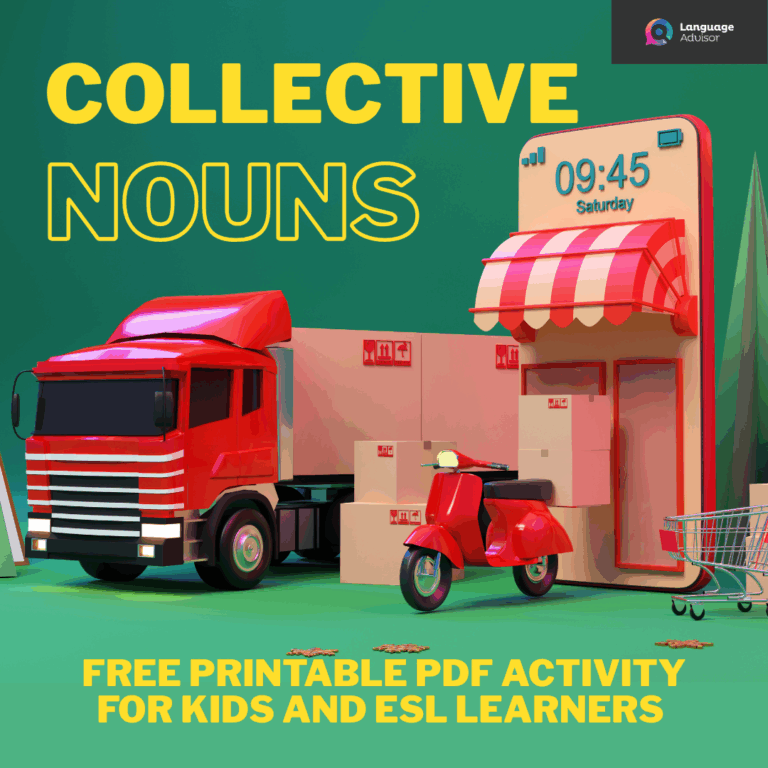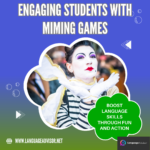Word Association Games for English Classes. Unlock Creativity and Boost Vocabulary with Fun and Interactive Word Play
Word Association Games

Word Association Games
Engaging students in learning English can be a challenge, but incorporating word association games into your lessons can make a significant difference. These games not only break the monotony but also stimulate creativity, enhance vocabulary, and improve language skills in a fun and interactive way. In this blog post, we will explore the benefits of word association games, different types you can incorporate into your English class, and tips for maximizing their effectiveness. Whether you are teaching beginners or advanced learners, word association games can be a powerful tool in your educational arsenal.

A Ship Comes Loaded

This ESL word game is simple to set up and play without any preparation.
Age/Level: Any
Time: 15 minutes
Players: Individual
Preparation: None
Aim: To remember and say words beginning with a certain letter
Procedure
Sit the students in a circle.Let the students choose a letter of the alphabet, e.g. B.Tell the students that all the words they say must begin with the chosen letter.
Start the game by saying, “A ship comes loaded.“The first student replies, “with what?” and you say a word beginning with the chosen letter, e.g. with bananas.Then, the first student continues to say to the next student “A ship comes loaded.“The next student replies, “with what?” The student says, “with bananas and buffalos” for example.
This continues around the class.The students have to remember what words have been said, and they have to come up with a new word beginning with the letter that they decided to play with.
Students aren’t allowed to write anything down.If a student fails to remember all the words that have been said or if he/she can’t come up with a new word, that student is out of the game.
Whoever can stay in the game the longest is the winner.

Balderdash
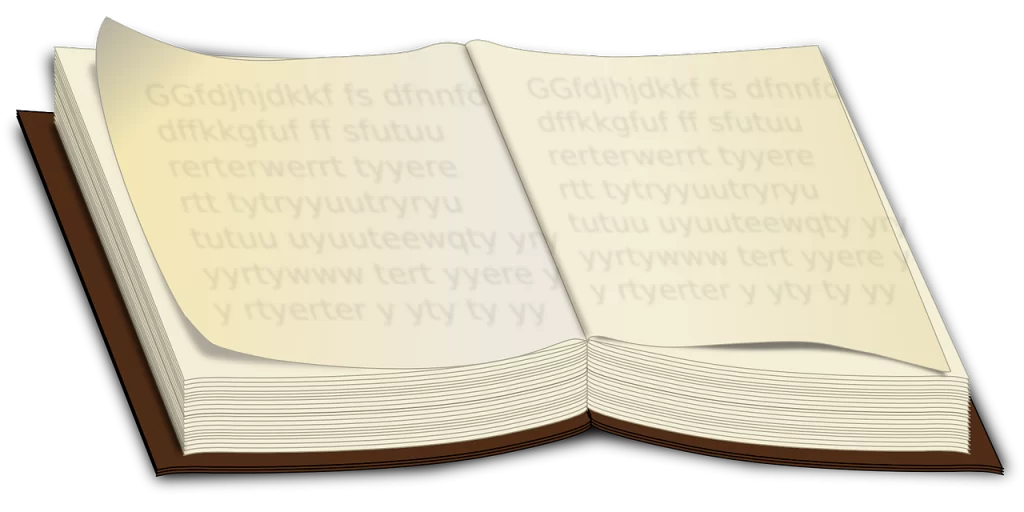
This ESL word game is based on a popular board game of the same name. Students invent false definitions for words and win points by correctly guessing true definitions. Before you play the game, have the students find obscure words and their definitions. Alternatively, you can use the sample word list below.
Age/Level: Elementary and above
Time: 25 minutes
Players: Individual
Preparation: A list of obscure words and their definitions
Aim: To invent false definitions and guess true definitions
Procedure
- Split the class into groups of four or five and provide small slips of paper for players to write definitions on.
- Each player should have a few obscure words and their definitions on a piece of paper.
- Players take it in turns to be the leader. The leader of the round chooses one of their words, reads it aloud, and spells it.
- Each player then invents a false meaning for this word that could fool the other players and writes it on a slip of paper.
- The leader should copy the true definition onto their slip of paper, so that they cannot be seen reading from the word card.
- Each player then hands their definition to the leader. The leader reads aloud each definition, including the correct one.
- The players then vote on which definition they think is correct. The leader reveals the true meaning and adds up the scores. Then, another player becomes the new leader and play continues.
Scoring:
- 1 point for every vote your false definition receives.
- 2 points if you choose the correct meaning.
- The leader gets 3 points if nobody chooses the correct meaning.
Balderdash word list
- aulete a person who plays the flute
- belocolus a magic stone that makes a soldier invisible
- bettong a small kangaroo
- boletus a variety of wild mushroom
- collutory antiseptic mouthwash
- crwth a 6-stringed violin
- dorking a chicken with 5 toes
- exoduster someone who leaves town in a hurry
- fard to put on makeup
- forney a ring worn on the fourth finger
- galligaskins loose baggy trousers
- gravid pregnant
- hippiater a horse doctor
- histrixite a Tasmanian mineral containing copper and iron
- jargonelle a pear which ripens early
- mantelet a bullet-proof screen
- mawworm a hypocrite
- noddlethatcher someone who makes hats and wigs
- oxter to walk along arm in arm
- ozostomia bad breath
- pistareen a Spanish coin worth 20 cents
- ramfeezled exhausted, tired
- sclaff to scrape the ground with a golf club before hitting the ball
- screeve to draw pictures on a sidewalk for money
- shiggers tight trousers worn by football players
- splate a substance used in shoe making
- toison the wool of a young sheep
- tranka a long cylindrical box which jugglers balance with their feet
- wakiup an American Indian hut
- wallygowdy a precious jewel or gem

Lewis Carroll’s Game
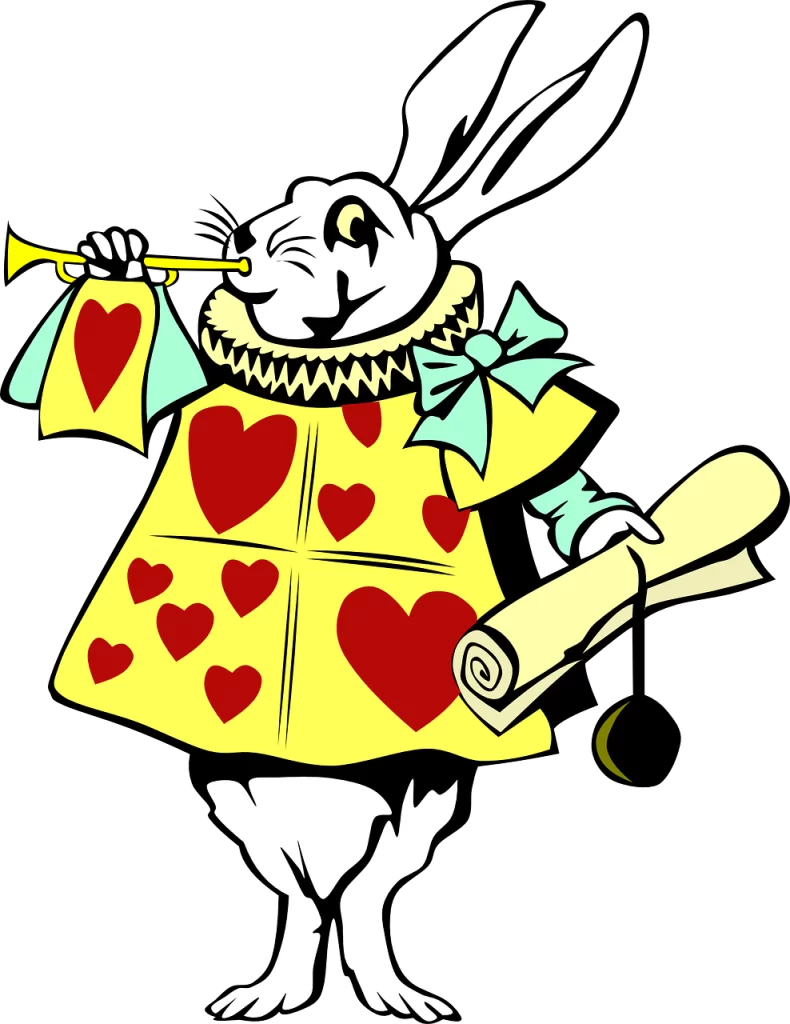
This delightful word game was invented by Lewis Carroll, who wrote ‘Alice in Wonderland’.
Age/Level: Elementary and above
Time: 20 minutes
Players: Small teams
Preparation: None
Aim: To change one word into another by changing one letter at a time
Procedure
- Tell the students that they are going to play a game where they change one word into another by changing one letter at a time. Letters cannot be moved, merely substituted. Every time a letter is changed, it must result in an English word.
- Give the following example to the class to help them understand:Example: wet to dry
wet – met – mat – may – day – dry - Next, separate the class into small teams. Start them off with one of the easier examples below. Write both the original and final word on the board.
- Allow the teams to use dictionaries to help them with possible words.
- Teams score points according to the number of steps taken to turn one word into another.Example:
wet – met – mat – may – day – dry = 6 points - At the end of the game, the team with the ‘lowest’ score wins.
Examples:
- cat – cot – dot – dog
- shoe – shot – soot – boot
- cow – cot – pot – pit – pig
- few – new – net – not – lot
- give – live – like – lake – take
- boy – toy – ton – ten – men – man
- love – live – give – gave – gate – hate
- road – read – lead – lend – land – lane
- hard – card – cord – ford – food – foot – soot – soft
- hand – band – bend – bead – beat – boat – boot – foot
- cold – sold – sole – mole – male – mare – ware – warm
- meat – beat – bent – went – want – cant – cane – cone – bone
- wind – wine – line – lane – land – sand – said – paid – pain – rain
- wolf – golf – gold – bold – bolt – boat – boar – bear – beer – deer
- pear – bear – beat – bent – bend – bind – wind – wine – line – lime
- wood – wool – pool – poor – pour – four – foul – soul – soil – sail – nail
- rich – rice – ripe – pipe – pine – dine – done – bone – bore – born – morn – moon – moor – poor

Mallet’s Mallet

This enjoyable ESL word association game has been adapted from an English TV show. It works well for revising words and can be adapted for any age or level. Your students will certainly have a lot of fun playing this game. You will need an inflatable hammer or toy for this game.
Age/Level: Any
Time: 20 minutes
Players: Individual or 2 teams
Preparation: An inflatable hammer or toy
Aim: To say words relating to a category
Procedure
There are two ways to play this word association game.
First Way:
- Divide the students into two teams.
- Have the students line up in their teams.
- Put two chairs at the front of the classroom.
- Get the first player from each team to come and sit on the chairs. Give the two players a category, e.g. sports.
- The two players then take turns to say a word associated with the category.
- If a player hesitates, repeats a word, or doesn’t answer, they get hit with the inflatable hammer or toy and are replaced by the next player in their team.
- When a student beats three opposing team members, they step down and let someone else play.
- The first team to run out of players loses.
Second Way:
- Get the students to sit in a circle.
- Give the students a category.
- Starting with any student, go around the circle until a student hesitates, repeats a word, or doesn’t answer. That student is out and leaves the circle.
- Repeat with a new category until one student is left. That student is the winner.

Match the Squares

You can use this matching game to review a great deal of vocabulary. It can be used when you have two words that match in some way, e.g., adjective opposites, verb opposites, prepositions, past and present verbs, etc.
Age/Level: Any
Time: 20 minutes
Players: 2 teams
Preparation: A completed word grid
Aim: To memorize and match pairs of words
Procedure
- Draw a 6 x 4 grid on the board and number the squares 1 to 24. You could have a bigger or smaller grid, depending on how many pairs of words you have to match. Make sure you have a completed word grid in hand when you play the game.
- Divide the students into two teams.
- Explain to the class that behind each square is a word.
- The objective of the game is to match the squares by remembering where each word is. Tell the students that they cannot write anything down. They must remember the positions of the words.
- The first team selects two squares, e.g., number 2 and 16. Write the two corresponding words in the selected squares.
- If the words match, the team gets a point and has another go.
- If they don’t match, the two words are erased and the other team selects two squares, and so on.
- Continue until all the word pairs have been found. The team with the most points is the winner.
Example Grid:
| 1 | 2 | 3 | 4 | 5 | 6 |
|---|---|---|---|---|---|
| 7 | 8 | 9 | 10 | 11 | 12 |
| 13 | 14 | 15 | 16 | 17 | 18 |
| 19 | 20 | 21 | 22 | 23 | 24 |
Prepare a list of word pairs and randomly assign them to the grid. For instance:
- Happy – Sad
- Buy – Sell
- Above – Below
- Hot – Cold
- Before – After
- Win – Lose
- Fast – Slow
- Come – Go
- Thick – Thin
- Right – Wrong
- Open – Close
- Day – Night

Password

This is an imaginative ESL word association game to play with your students. Before you begin the game, have the vocabulary you wish to revise written down on small pieces of paper.
Age/Level: Any
Time: 20 minutes
Players: 2 teams
Preparation: Word slips
Aim: To associate one word with another
Procedure
Separate the students into two teams.
One player from each team comes to the front of the class. Show both players a word. This is the ‘Password’.
The aim of the game is for the teams to try to guess the password.
They do this by word association, e.g., If the password is ‘flower’, a player might say “roses”. His/her team then tries to guess the password by associating the word “roses” with another word.
If a team guesses correctly the first time, they win 5 points. The second time, they get 4 points, and so on.
The players at the front of the class take turns to associate one word with the password. So, both teams play for 5 points, then 4 points, etc.
If they can’t guess correctly after five times, the players are changed and a new password is given.
When a password is correctly identified, new players come to the front and start with a new password.
The team with the highest number of points at the end wins.

The Longest Word

In this word game, students make the longest word they can from letters won by guessing the answers to clues.
Age/Level: Any
Time: 20 minutes
Players: 2 teams
Preparation: A list of words beginning with each letter of the alphabet and clues
Aim: To make long words by winning letters
Procedure
Split the class into two teams. This game can also be played with more teams if you wish.The first team chooses a letter.
Choose a word beginning with that letter and give the class a clue for the word.The first member of either team to guess the word correctly wins the letter for their team. The winning team then chooses another letter.
The aim is to get enough letters to make a long word.At a suitable point, end the round and let the teams try to make the longest word possible from the letters they have won.
The team with the longest word wins the round and is awarded the same amount of points as there are letters in the word. Play a few rounds to see which team is the overall winner.

The Picnic Game
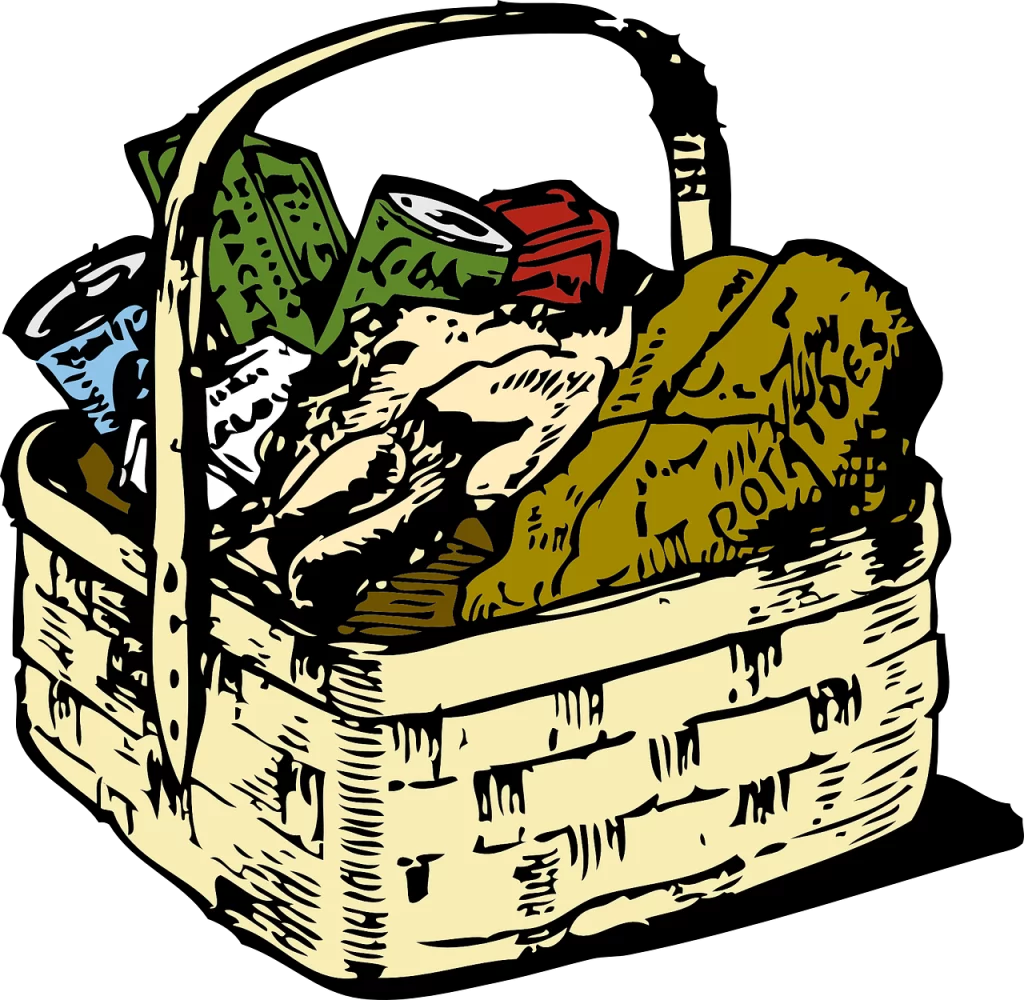
This ESL brain teaser game can be played over a few weeks until the majority of the students have worked out the game.
Age/Level: Young learners
Time: 10 minutes
Players: Individual
Preparation: None
Aim: To say an object that begins with your first name
Procedure
Ask the students to sit in a circle and tell them that they have to imagine they are going on a picnic.
They must try to think of something to take with them.You begin by saying, “I would take a …” Then, you say something that begins with the first letter of your name, e.g., if your name was Paul, you might say, “I would take a pineapple.”Listen to each student’s answer and reply yes or no.
Play one round each week.The students need to work out that they can take anything that begins with the same letter as their first name.

Tic Tac Words
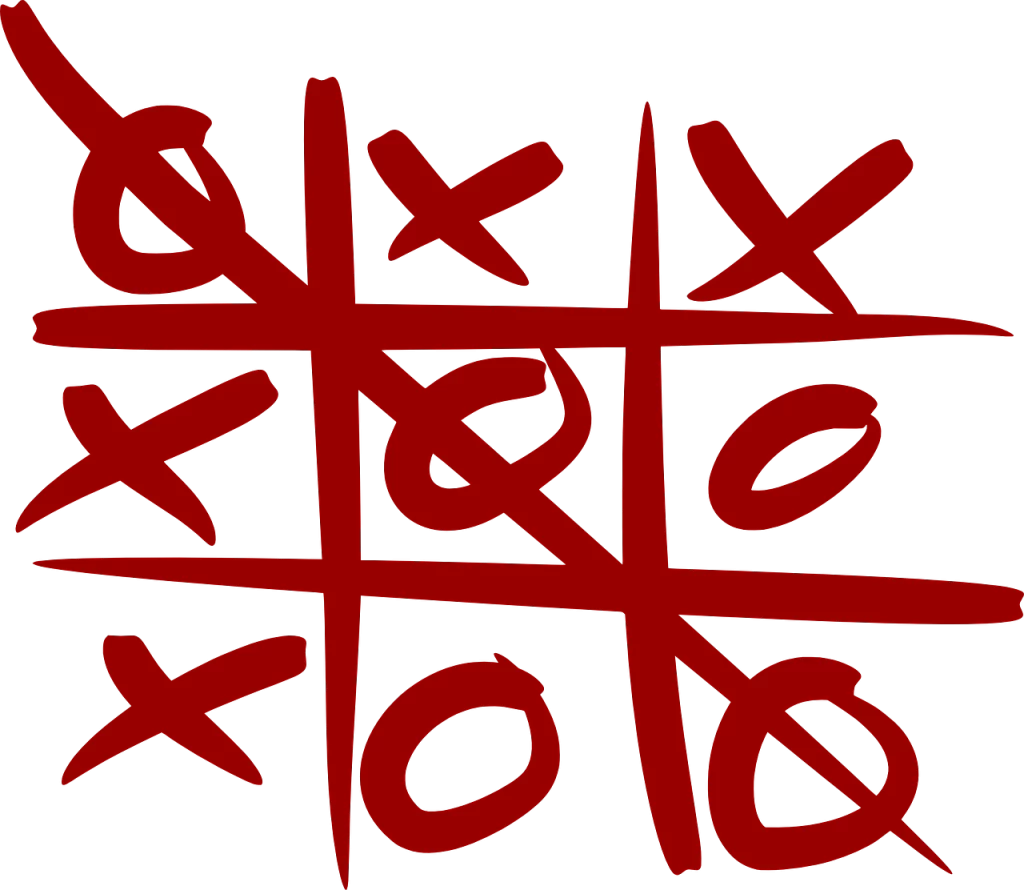
Here is a simple ESL word game that can be played without any preparation. This game is based on Tic-Tac-Toe.
Age/Level: Any
Time: 15 minutes
Players: 2 teams
Preparation: None
Aim: To say a certain number of words beginning with a particular letter in ten seconds
Procedure
- Draw a large square on the board and divide the square into a 3 x 3 grid, the same as Tic-Tac-Toe.
- Write a random letter in each square and then write a small number under each letter.
- Split the class into two teams. Assign the two teams with an X or O symbol.
- Flip a coin to see which team will go first.
- The winning team then chooses a letter from the grid. That team has ten seconds to say as many words beginning with the letter as the number under the letter indicates.
- If the team manages to say the required number of words, they win the square and their symbol is placed in the square.
- If the team cannot come up with the required number of words, they must pass to the next team.
- The number you write under each letter will be determined by the ability of your students. If your students’ level of English is limited, put down a small number in each square.
- When a team gets three symbols in a row, either horizontally, vertically, or diagonally, they win the game. If there is a tie, the team with the highest number of symbols on the board wins.

Two Words

This word game is easy to play and makes a fun warm-up activity with small classes. It can also be helpful for reviewing vocabulary with the students.
Age/Level: Any
Time: 20 minutes
Players: 2 teams
Preparation: None
Aim: To make a complete sentence that includes two specified words
Procedure
- Divide the class into two teams.
- Tell the students that you are going to write two words on the board.
- Explain that the first student to put up their hand and create a complete sentence using both the words will win the round for their team.
- The winning team then chooses one student from the other team to come and join them.
- If the students know each other well, they normally choose the students who are really good at English, making it easier to win the game.
- Write two new words on the board and the game continues. In the end, there will only be one team left. So everybody wins!
It’s best to start the game off with some easy words, e.g., T-shirt/shorts. Then, gradually make the words harder or crazier, e.g., water/chocolate.

Word Association Game

This word association game is easy to play and set up.
Age/Level: Any
Time: 15 minutes
Players: Individual
Preparation: None
Aim: To associate words
Procedure
- Ask all the students to stand up.
- Choose a word that you are currently teaching.
- The first player says any word that they associate with the chosen word. The next player must then do the same with the first player’s word.
- This continues from player to player.
- If a player says a disassociated word, repeats a word, or is too slow to answer, they are out and have to sit down.
- The winner is the last person left standing.
Example: ocean, blue, green, field, flower, valentine, love, heart, etc. Alternatively, you may ask the students to associate only with your chosen word.

Word Disassociation Game

Here is a fun game to use with any level. This game is the opposite of word association.
Age/Level: Any
Time: 15 minutes
Players: Individual
Preparation: None
Aim: To disassociate words
Procedure
- Ask all the students to stand up in a circle.
- Tell the students that they have to shout out the first word they think of when they hear another word. However, the word they say must have no connection with the previous word.
- Start by choosing a word at random.
- The first player then says a word that is completely disassociated with your word. The following player does the same with the first player’s word and so on.
- If a player says a word that is connected with the previous word, takes too long to answer, or repeats a word, they are out of the game and have to sit down.
- Anyone can challenge a player if they think there is a connection. If the connection is agreed, that player is out of the game.

Word Square
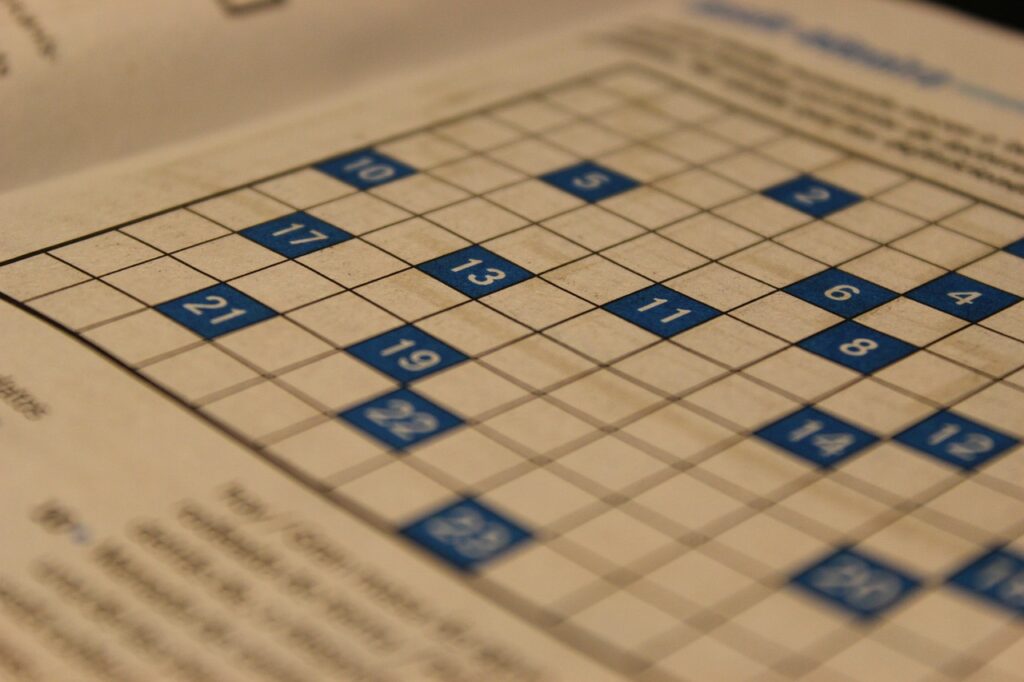
This is a wonderful ESL word game to play with your students.
Age/Level: Any
Time: 20 minutes
Players: Teams of 3 or 4
Preparation: None
Aim: To make words using letters in a square
Procedure
Procedure
- Draw a 3 x 3 grid on the board.
- In the square, write a nine-letter word in a random order. The centre square must contain a vowel. You can use any nine-letter word for this game. Ideally, it should be one that contains a few different vowels.Examples: scrambled, Christmas, blueberry.
- The aim is to make words using the letters in the square. Every word the teams write must contain the centre letter. Students cannot use any letters twice, unless it is in the nine-letter word. There is a bonus score if they can make one word using all nine letters.
- Put the students into small groups of three or four.
- Set a time limit of ten minutes.
- The teams write as many words as they can from the square.
- When the time is up, get each team to swap sheets with another team, and count up the letters and words. The teams check the words and spelling, and the teacher answers any queries from the students.
- The game is scored by the length of the words. So, a three-letter word is worth three points, a four-letter word is worth four points, and so on. If a team gets the nine-letter word, they win 18 points.
- The team with the most points wins.
Example: Scrambled
| R | M | C |
| B | A | L |
| S | E | D |

Word Association Games for English Classes
Word association games are a dynamic and versatile addition to any English class. They foster a collaborative learning environment, encourage critical thinking, and make language learning an enjoyable experience. By incorporating these games into your curriculum, you can help students expand their vocabulary, enhance their cognitive skills, and develop a deeper appreciation for the English language.
So, why not give word association games a try in your next lesson? Your students are sure to enjoy the challenge and excitement they bring to the classroom.
Word Association Games for English Classes
Word Association Games for English Classes. Also check out these activities to improve vocabulary



